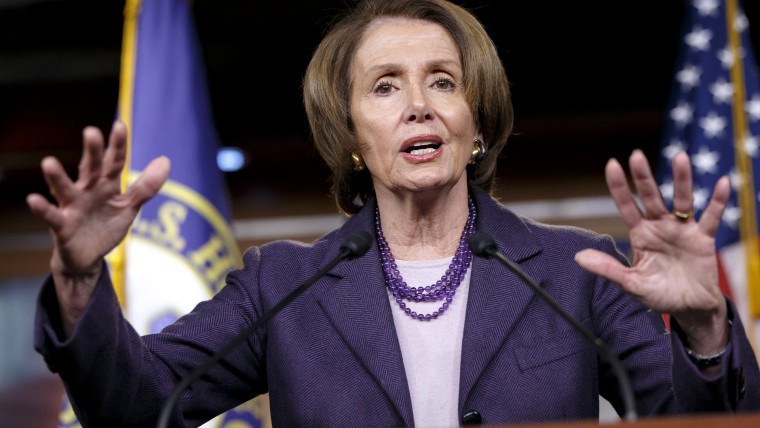Once it became clear last week that House Democrats would reclaim their majority on Capitol Hill, it was widely assumed that House Minority Leader Nancy Pelosi (D-Calif.) would once again wield the Speaker's gavel. That assumption, however, may have been premature.
The Washington Post reported overnight:
House Democratic leader Nancy Pelosi on Wednesday faced solid opposition from at least 17 Democrats and encountered a significant bloc of undecided women in her bid for speaker, setting the stage for an intense battle over who will ascend to one of the most powerful positions in Washington.After a campaign in which some Democrats prevailed in competitive districts by promising to oppose her, a coalition of incumbents and newly elected members have denied her a smooth path to the speakership.
Pelosi and her allies are confident that she'll prevail. The Californian's Democratic detractors are confident they'll block her path. They can't both be right.
The drama is likely to intensify between now and the official vote on Jan. 3, but in the meantime, it's worth pausing to question why in the world Pelosi's ascension isn't automatic.
Not to put too fine a point on his, but Pelosi is one of the most skilled and accomplished legislators in a generation. We tend to name buildings after congressional leaders with her kind of record. The list of Barack Obama's accomplishments is long, but for those who watch Capitol Hill closely, it's no secret that many of the former president's successes would not have happened were it not for the efficacy of Nancy Pelosi's leadership -- on issues ranging from health care to civil rights to the economy.
Ordinarily, when a party looks to make dramatic changes to its congressional leadership, there's an easily identifiable reason. Maybe a party leader gets caught up in a scandal. Maybe he or she suffered an embarrassing series of failures. Maybe, under his or her leadership, the party just suffered a brutal electoral setback, prompting rank-and-file members to look for a major directional shift.
None of this applies to Pelosi. She's had no scandals. She's made no major legislative mistakes. She's led a House Democratic caucus that just saw its greatest gains since the immediate aftermath of the Watergate scandal nearly a half-century ago.
All of which leads to the question of what's motivating her intra-party critics. Some have stuck to the line, for example, that it's "time for a change." That may or may not be true, but it's not really an argument, per se. It's incumbent on proponents to explain why there should be a change, who would lead the change, and how it would be better than the alternative. So far, on this front, anti-Pelosi Dems have fallen short.
Another line from this contingent is that Republicans have succeeded in making Pelosi "toxic," making it necessary to find a new Democratic leader who'd enjoy stronger public support. But this, too, is unpersuasive. For one thing, whomever House Dems chose would be the target of GOP attacks, and replacing Democratic leaders because Republicans don't like them is folly.
For another, the popularity of congressional leaders doesn't seem to have any real practical significance. Mitch McConnell is unpopular, too, but the Senate Republican majority is poised to grow. The right went after Nancy Pelosi with a vengeance throughout 2018 and House Dems added nearly 40 seats anyway.
So who cares what her approval rating is?
Finally, I've heard many Pelosi detractors point out that she's not a powerful media presence, and she's stronger as a behind-the-scenes legislative leader and negotiator than as a public spokesperson. There's some truth to this. But again, Paul Ryan has long been a media darling -- whose list of legislative accomplishments fits comfortably on a bar napkin and whose party just lost its House majority.
Pelosi is good at this job. We know this to be true because we've seen her succeed at it. Common sense suggests House Democrats should be urging her to seek the Speaker's gavel, not looking for ways to keep it out of her hands.
Postscript: As the process unfolds, keep an eye on some of the procedural tactics. The next big step will be members of the House Democratic caucus formally choosing a nominee for Speaker on Nov. 28. If Pelosi enjoys the overwhelming support of Democratic members, and the faction opposing her withers soon after, that will be that.
But as I understand it, part of the push from anti-Pelosi Dems is the threat of a rebellion on the House floor. The next Speaker will need 218 votes, and her detractors are making it clear that they're prepared to oppose her, not just at the caucus meeting when the party chooses a nominee, but also during the floor vote.
The obvious analogy is a presidential nominating process: the anti-Pelosi Dems are effectively saying they're prepared to oppose their party's nominee during the "primary" process, and if they don't get their way, they'll help defeat their party's choice in the "general election," too.
Watch this space.
